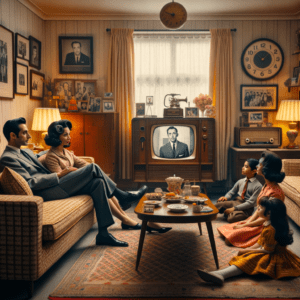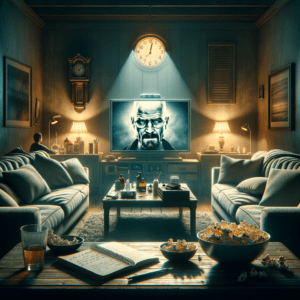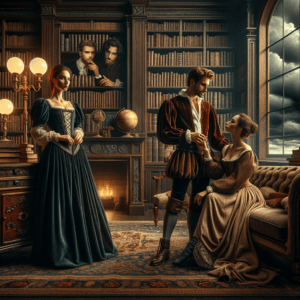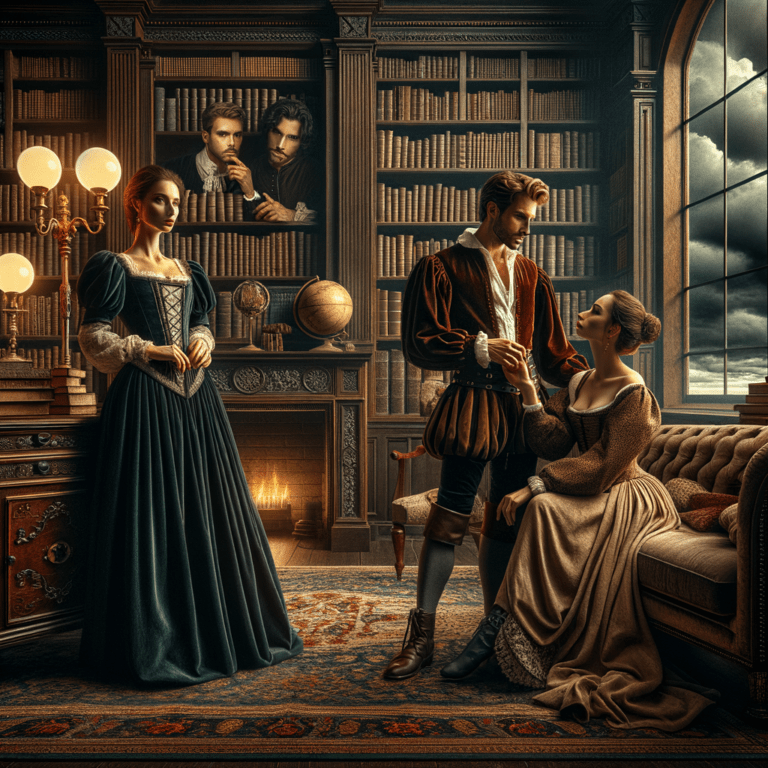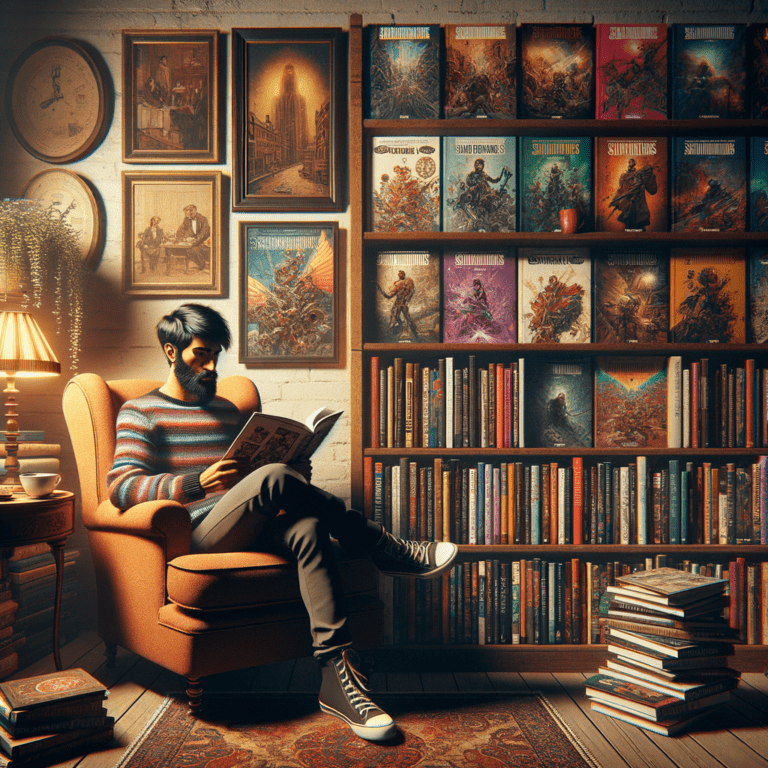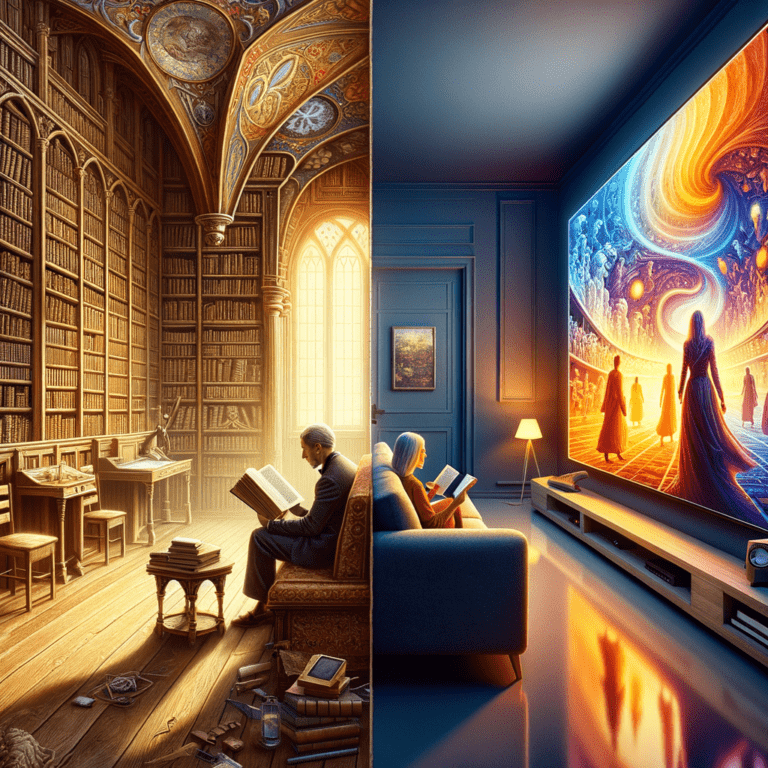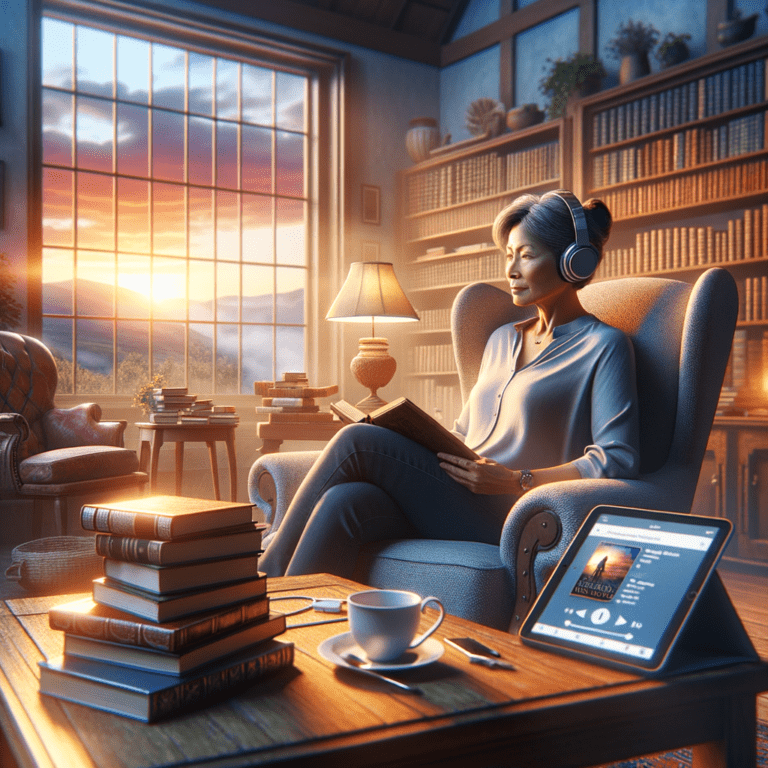TV adaptations of beloved books… they’re like marmite, aren’t they? Either you’re all in and loving it, or you’re left shaking your head in disbelief. I’ve found myself tangled in the pages of books and glued to the screen watching TV series for hours (days even, if I’m honest), so I get it—the entire wild ride of emotions when your favorite novel gets the TV treatment. I mean, it’s not always pretty, but it is one heck of an adventure. So, let’s chat about the magical, and sometimes maddening, world of TV adaptations and how they square off against the original books!
The Magic of Words vs. Visual Storytelling
So here’s the thing: reading a book and watching a TV show? Completely different ball games. Books let you ride this personal little roller coaster where everything is left to your imagination. The characters? The setting? It’s all a world built just for you with words. That’s the true beauty of a book – it’s an invite-only show for your mind.
Then you’ve got TV shows—turning imagination into Visuals-Ville. You’re seeing the director’s and screenwriter’s fantasies, not yours. Sometimes it’s a fantastic transformation that has you cheering, and other times it feels like they’ve scribbled over a masterpiece with crayons. You feel me? The magical mystery of words kinda disappears when you’re fed every detail.
But let’s face it, seeing your beloved story in high-definition can be an absolute thrill. Hearing the characters’ voices, watching those scenes—you’ve played out a gazillion times in your head—get lived out on screen? Yeah, chills. Even if it sometimes feels like biting into what you thought was a chocolate cookie only to get a raisin—disappointment, but you’ll still munch your way through hoping for a chocolatey bit next time.
Characters: From Page to Screen
Oh boy, let’s talk characters. There’s nothing quite like having your mental picture of a character dashed to bits by a casting choice. I’ve been there, where the lead character pops up and you just stare, thinking, “Wait, that’s not how it’s supposed to be!” It’s not only about the look, but the whole vibe, the essence.
Take “Game of Thrones” for example. Tyrion Lannister is a character, richly layered with wit. On TV, Peter Dinklage? His performance was just phenomenal, obviously. But some tiny, yet essential, book details get sanded down or swapped out. Then there’s “The Handmaid’s Tale.” The onscreen June is vibrant with defiance—a bit more than what’s in the book—which some purists get twitchy about.
Characters in adaptations can feel like they’ve ballooned or shrunk depending on the storyteller’s vision. Sometimes it’s a bullseye, and other times… they’ve wandered off into left field.
Storylines and Plot Deviations
Ah, plot twists—or should I say plot deviations? This is where everything can go a bit sideways. Books have this luxurious endless page space to dive into every nook and cranny of a plot. TV? They have to squeeze it all in. It’s like bathing in a tub of glorious story and then suddenly having someone say, “Quick, you’ve got two minutes to rinse!”
Take “Outlander,” for instance. Diana Gabaldon’s tapestry of stories gets a nod in TV land, but they sometimes slice and dice parts to fit. Watching it, you can feel that tug of war—staying true to the original or morphing enough to grab a TV audience.
Oh and, remember “The Walking Dead”? It sticks to the graphic novels at the start, then throws the book out the window later on. Some fans griped, others stayed on for the ride. It raises this intriguing question: once adapted, who really owns the story?
The Curse of Expectation
Expectations? Yeah, they’re tough. Literary fans like me, when a book gets the TV nod, it feels like you’re staring at skyscraper-sized expectations.
Take “His Dark Materials,” a long-awaited visual giant. It stayed mostly in line with its roots, yet those skyscrapers of expectation cast a long shadow. Some folks wanted ultra accuracy, others were hoping for a new spin. Balancing these extremes is as impossible as, well, balancing on the edge of a book page.
Then there’s the fact that sometimes TV series are some folks’ first introduction to the story. Different expectations lead to clashing opinions on the whole shebang of the series’ intricacies. At times, you just gotta let go and think, “Hey, I’ll appreciate the show for what it is.”
The Feeling of ‘Something Missing’
Adaptations can leave you with that…hollow feeling. A book has time to pull you down deep into all the details, while the screen sometimes just gives a touch of the surface.
Take “Sharp Objects,” based on Gillian Flynn’s work. It’s haunting on screen with Amy Adams, but Camille’s inner musings? So much richer in the book, right? It’s like the choice between a deep-sea dive and a paddle in the shallow end.
Bringing words to the screen naturally clips some wings. Motivations sometimes feel muted, and you miss that juicy, reflective prose of your best-loved book. Reception often rests on being able to accept what’s gained with what’s lost.
When Change is a Good Thing
Okay, it’s not always a doom and gloom tale! Some adaptations breathe new life into a book, giving it a refreshing twist you never saw coming.
Take “Big Little Lies”—the TV series broadened beyond Liane Moriarty’s book. New layers, added characters, bam, a deeper and more relatable story sprung to life. Watching the show, it almost feels like, “Wow, maybe that’s what was missing.”
Finding success in adaptation means honing in on what makes the book special and crafting something beautiful around it. Even if that means a little creative detour.
Personal Stake and Emotional Investment
Books—they’re personal treasures, aren’t they? For me, each one is like a story-bound friendship. When I hear about a TV adaptation, excitement wrestles with worry—it might soar, or it might crash. Emotional chaos, right?
I remember my first watch of a beloved book’s TV debut. It was an emotional see-saw—cringing at potential letdowns, yet ready to leap back into a cherished world if things pan out right. Investing emotions in adaptations is a gamble, but when it pays off? Oh, the joy!
Adaptations mean different folks might find the story for the first time, forging new discoverable moments beyond the pages. And that turns apprehension into hope.
Concluding Thoughts
So when it boils down to books versus TV adaptations? There’s no clear winner. They’re different flavors of the same meal, each with its own charm. Your own experience will dance with your personal attachments, expectations, and openness to change.
Switching between books and TV, I keep reminding myself: the book remains untouched. It’ll always be there like a comforting mug of cocoa after a long day. Whether a TV show aligns with or drifts from its anchor book, it’s about the rich blend of emotions unleashed. That’s the heart of storytelling, right?
At the end of the day, my little voyage between paper and pixels is one of delightful discovery—about the stories and myself—and honestly, I wouldn’t trade it for anything else.


